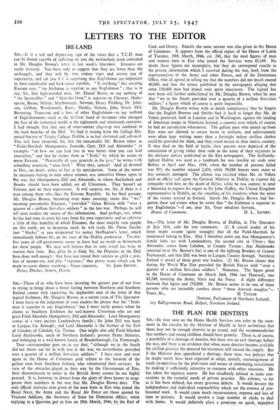LETTERS TO THE EDITOR
IRE-LAND Sia,—h is a sad and depressing sign of the times that a T.C.D. man can be found capable of inflicting on you the melancholy trash contained in Mr. Douglas Brown's letter in last week's Spectator. Eireanns are easily irritated. You have only to suggest that they are lower than the archangels, and they will fly into violent rages and accuse you of superiority, and ask you if i- is surprising that Englishmen are unpopular in their ramshackle and back-street republic. " If anything," this amazing Eireann says, " the Irishman is superior to any Englishman " ; that is to say, Sir, that high-minded man, Mr. Daniel Breen, to say nothing of " the Invincibles " and " Skin-the-Goat," is superior to Chaucer, Shake- speare, Bacon, Milton, Marlborough, Newton, Henry Fielding, Dr. John- son, Gibbon, Wordsworth, Keats, Shelley, Nelson, John Stuart Mill, Browning, Tennyson and a host of other Englishmen—to say nothing of Englishwomen—such as the brilliant band of inventors who changed the face of the industrial world in the eighteenth and nineteenth centuries. I had thought that that sort of street-corner clap-trap was confined to the back benches of the Dail. To find it issuing from the College His- torical Society of Trinity College, Dublin, is to feel shattered and ashamed. You will have observed, Sir, that the remarkable Mr. Brown refers to " Field-Marshals Montgomery, Ironside, Gort, Dill and Alexander " as examples " of how we can lead you in war better than you can lead yourselves," and that he claims them as " Irish," by which he seems to mean Eireann. " Practically all your generals in the past," he writes v. ith schoolboy assertion, " were Irish " Were they, indeed? And all devoted to Dev., no doubt, either in fact or by anticipation. Some of the names he mentions belong to men whose renown was somewhat blown upon in he war, but Montgomery, Dill and Alexander, to whom Auchinleck and Brooke should have been added, are all Ulstermen. They haven't an Eireann spot on their reputations. It will surprise me, Sir, if there is a man among them who likes the Eireann Republic. In his final passage, Mr. Douglas Brown, becoming even more amazing, states that " we," meaning presumably Eireanns, " provided " Great Britain with " over a quarter of a million first-class soldiers " in the late war. Perhaps he will tell your readers the source of this information. And perhaps, too, when he has had time to avert his eyes from his own superiority and to cultivate a little of that humility of which Eireanns, the most emptily vain people on this earth, are in desperate need, he will study Mr. Owen Sheehy (not " Slecky," as you misprinted his name) Skeffington's letter, which immediately follows his, on the state of the Dublin proletariat. Twenty- five years of self-government seems to have had no result in betterment for these people. We may well believe that its only result has been to worsen their lives. But, glory be to God, Sir, the Deputies in the Dail have done well enough : they have just raised their salaries to £624 a year, free of income-tax, and plus " expenses," that pretty word which can be made to cover almost anything.—Yours sincerely, ST. Joins ERVINE. Honey Ditches, Seaton, Devon.


































 Previous page
Previous page